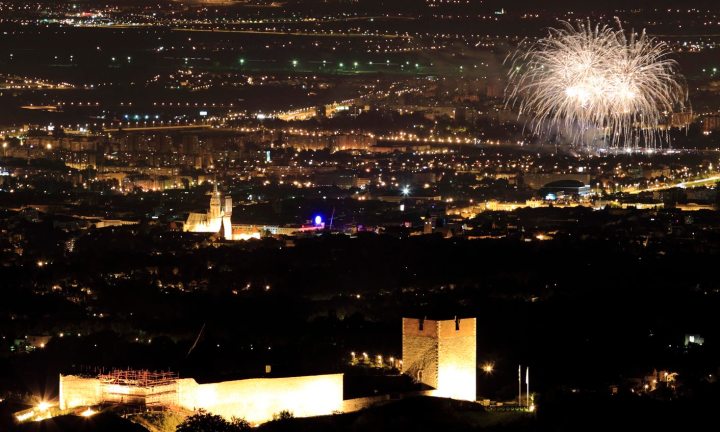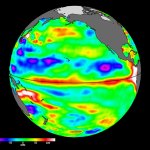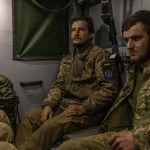Newsdeck
Forged In War, Ex-Yugoslav Croatia Joins EU

To fireworks, cannon-fire and Beethoven's Ode to Joy, Croatia joined the European Union at midnight on Sunday, two decades since fighting itself free of Yugoslavia. By Zoran Radosavljevic and Igor Ilic.
Thousands packed Zagreb’s Ban Jelacic square to celebrate the accession of the bloc’s 28th member, setting aside for a moment the troubles of a country in its fifth year of recession.
“This will change the life of this nation for good. I welcome you wholeheartedly,” Herman Van Rompuy, president of the European Council, told the crowd.
Bells rang out from Zagreb Cathedral and two men in white abseiled from a nearby building carrying the flag of the EU.
The mainly Catholic country of 4.4 million people becomes only the second of the seven states carved from federal Yugoslavia to enter the EU, following Slovenia in 2004.
It marks a milestone in the region’s recovery from the wars of the 1990s, which gave the world the term “ethnic cleansing” and killed over 120,000 people, 20,000 of them in Croatia.
It is also the first expansion of the EU eastwards since 2007, when Romania and Bulgaria joined, and the “Big Bang” enlargement of 2004 when 10 new members came aboard.
The global economic crisis has since posed unprecedented challenges to the unity of the bloc, undermining popular support and fuelling doubts over the wisdom of further expansion to the former Yugoslavia.
The troubles of the EU have fed into doubts among many Croatians over their future inside the bloc, the pull of which helped stabilise the Balkans.
“I was so jealous of the others who joined before us,” said Ivan Borovec, as he queued to pass tight security checks to enter the square. “It would have been better if we had joined in 2004 but I still hope it will be better, particularly for our children.”
At Croatia’s eastern border with Serbia, its chief foe during the collapse of Yugoslavia, officials unveiled a sign that read “Croatia-EU”.
The ex-Yugoslav republics of Serbia, Bosnia, Macedonia, Montenegro and Kosovo are years away from EU accession.
Their leaders were present in Zagreb, in a show of unity among states that are still coming to terms with their parting.
SEVEN YEARS OF REFORM
Serbian President Tomislav Nikolic, once a fierce advocate of the “Greater Serbia” ideology that helped fuel the wars in Croatia and neighbouring Bosnia, was among them, underscoring the change the region has undergone.
“We don’t want Europe to stop at our borders, it must be open to other countries,” Croatian President Ivo Josipovic told the ceremony.
To join, Croatia has gone through seven years of tortuous and often unpopular EU-guided reform.
It has extradited more than a dozen Croatian and Bosnian Croat military and political leaders charged with war crimes, sold shipyards steeped in tradition but deep in debt, and launched a fight against graft that saw former prime minister Ivo Sanader jailed.
The country’s Adriatic coastline, from the hills of Istria in the north to the medieval city of Dubrovnik in the south, has become a magnet for some 10 million tourists every year.
But a biting recession has left one in five Croatian workers jobless and taken much of the shine off the country’s EU accession.
“Europe is all about work, work, work, no joy, no warmth,” said Agata Miletic, a mother of seven who came to the ceremony. “When you hear that some countries want to leave the EU, that they have no money, you can’t be optimistic.”
Pop mixed with opera and traditional music in a colourful ceremony replete with white-clad dancers and a rousing rendition of Ode to Joy, the anthem of the EU.
Van Rompuy and European Commission President Jose Manuel Barroso were among some 170 foreign officials, including 15 heads of state and 13 prime ministers. One notable absentee was German Chancellor Angela Merkel, who had said she was too busy to attend.
Croatian media linked the no-show to a row over a former Croatian secret service operative wanted in Germany, though a spokesman for Merkel denied this. DM
Photo: Fireworks burst over the cityscape during the International Fireworks Festival in Zagreb June 29, 2013. Croatia becomes the 28th member of the European Union at midnight on Sunday, a milestone that caps the Adriatic republic’s recovery from war but is tinged with anxiety over the state of the economy and the bloc it joins. REUTERS/Antonio Bronic




















 Become an Insider
Become an Insider